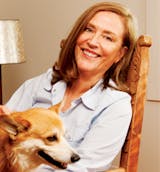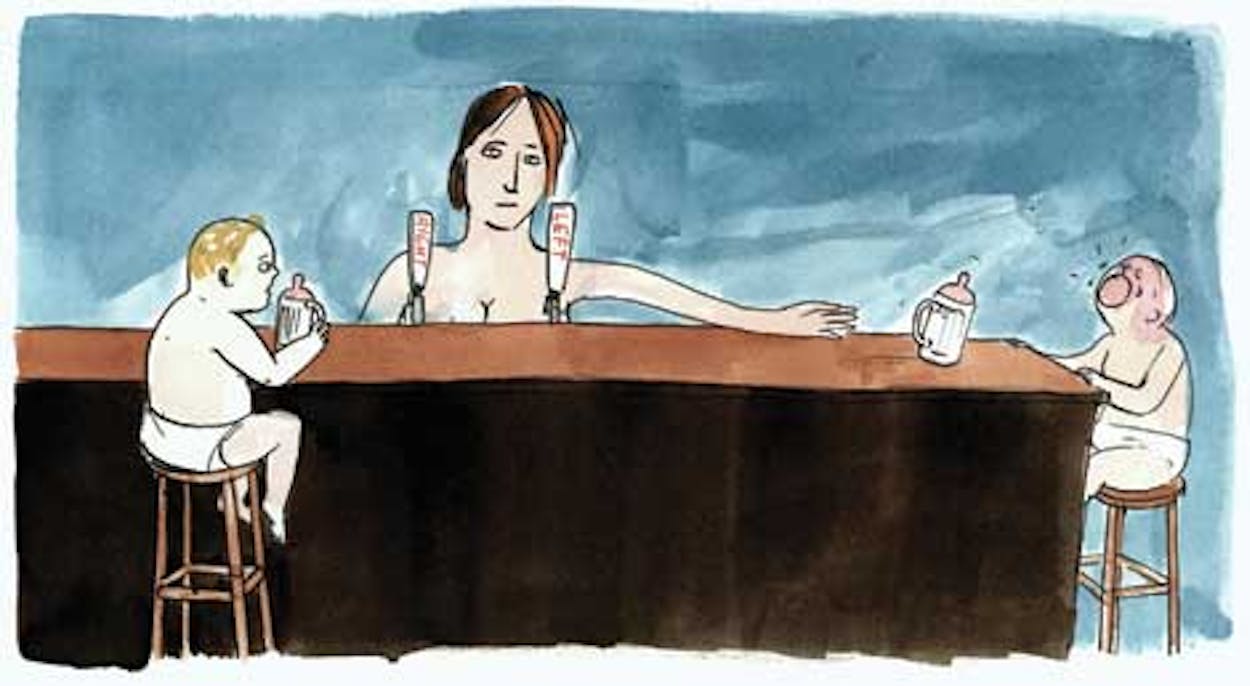Nothing can take the fun out of fun bags quite like breast-feeding. Putting the mommy in mommy muffins instantly transforms our hitherto fabulously recreational lady bumpers into no-nonsense, utilitarian dispensers of the Thin White Line, the last best hope for keeping our children from growing up with Joan Crawford intimacy issues and Bubble Boy immune systems.
I was always favorably disposed toward breast-feeding. For my mom, it was an opportunity to sit down with the newest of her six children, put her feet up, and suck down a Falstaff along with a Lucky Strike or two. I liked the idea of these little all-ages happy hours, everyone chilling and slurping down the beverage of his or her choice.
Fast-forward to my first La Leche League meeting, which I attended when I was five months pregnant. It’s hard to pinpoint the exact moment when the phrase “lactose intolerant” took on a whole new meaning. Could it have been when the speaker commanded us, brusque as a dominatrix (Mistress Mammary!), that we had to nurse for the entire first year of our child’s life, even if it meant divorcing ignorant, unsupportive husbands and quitting work? And beer and cigarettes? Might as well sign up for the short bus right now. Perhaps the decisive moment came when the hostess’s sturdy four-year-old son strode up to her, growled, “Nur-nur,” unbuttoned her blouse, and plugged in for a loud, lengthy refill. Which we all then had to honor as the very natural, very sacred experience it was.
When I related my time with the hard-line lactorati to a friend, she told me, “You have to meet Kristine. She will completely change your mind.” Having not even partially changed my mind in far too long, I made a date with Kristine Kovach, known professionally as the Mobile Mama, Austin’s most popular breast-feeding swami.
I met Kovach in the depths of Seton hospital, where she was setting up for class. I can’t say precisely whom I was expecting, but it wasn’t Pebbles Flintstone, whom Kovach, with her headful of sproingy red curls and petite body full of sproingy muscles, resembled. Except that she had five fingers on each hand, as well as a husband, John, an award-winning musician, and two children: a daughter, Ava, 19, and a son, Severin, 15. And she herself was 42—“Elvis’s death age.” Otherwise, she was the spitting image of Pebbles.
The classroom filled up with couples both well-off (husbands checking BlackBerrys, wives sporting expensive blond highlights and French-manicured toenails) and less well-off (dads in hoodies and oversized jeans, moms with tats and tongue studs). All spoke in whispers and had the awkward air of people trying to avoid eye contact in a proctologist’s waiting room. Kovach called the class to order and introduced herself. “I’ve been a lactation consultant for ten years,” she said. “It’s a silly job. When I meet people, they either think it’s some tech job, or, if they do know what lactation consulting is, the guys ask, ‘Do you need an assistant?’ So I just say I’m a spy.
“I’m not here to rip on formula. I’m formula-fed. I’m not retarded. I don’t hate my mom. I’m just here to give information. I’m sure you all have researched the car seat, the crib, and the monitor. Anybody know how much formula costs?”
Lots of shrugs. No guesses.
“Twenty-five dollars a can. If your baby is average and goes through ten cans a month, that’s two hundred fifty dollars. That’s a car payment every month. I saw a formula ad the other day that said, ‘Now even more like breast milk.’ You know what is just like breast milk? Breast milk.”
Kovach’s manner, forthright as a public health nurse, funny as a stand-up, melted embarrassment away, and the group warmed up. She moved on to the obstacles mothers wanting to nurse their infants might face. “My mom told me that breast-feeding was a fad. A fad? I’m sure that Joseph was out trying to find a convenience store open at night to buy some formula for Mary. Still, when I had my daughter, I was certain that I wouldn’t be able to breast-feed. That I was too little, too redheaded, too something. But she was born and drank like a frat boy.”
First-time parents enlarged their vocabularies with terms such as “latch,” “colostrum,” “football hold,” “let down,” and “engorgement.” Knowledge bases were enriched with new wisdom. “Women have two breasts,” she said, “because all mammals have twice as many teats as the average litter and it looks better in a sweater.”
A wispy blonde worried that she was too underendowed to make enough milk for her baby. Kovach replied, “I’ve seen about a thousand moms a year for the past ten years and do you know how many couldn’t make enough milk? Four. Look at me. Obviously I’m not Pamela Anderson. I had two huge babies and I made enough. Saying you won’t be able to make enough milk because your breasts are small is like saying you can’t see well because you have blue eyes.”
A second-time mom groused that her first baby wanted to nurse for ninety minutes at a time. “Yeah,” Kovach observed, “and some people want to have sex three times a day. We don’t always get what we want, and we don’t let ten-pound people make the decisions.”
I braced myself as Kovach moved on to the forbidden-substances list and waited for She Who Knows Breast to give us the party line. Instead she related an anecdote. “I heard of a doctor who told a mom that she would have to pump and dump for five days after she had one drink. I’d like to know where the formula company sent that doctor for a cruise. The rule is, if it’s in the head, it’s in the milk. If you feel drunk, don’t nurse. But nursing is not like being pregnant. You can eat sushi, you can change the cat box. Just don’t eat the cat box. One 6-ounce drink is not going to hurt your baby. In fact, a dark beer might increase your milk volume.”
As the class ended, all I could think was how much I wished I could teleport Kristine Kovach back to that La Leche League meeting. She had completely changed my thinking. I loved every word out of her mouth. My two favorites were “dark” and “beer”—but oh, Kristine, you had me at “engorgement.”









